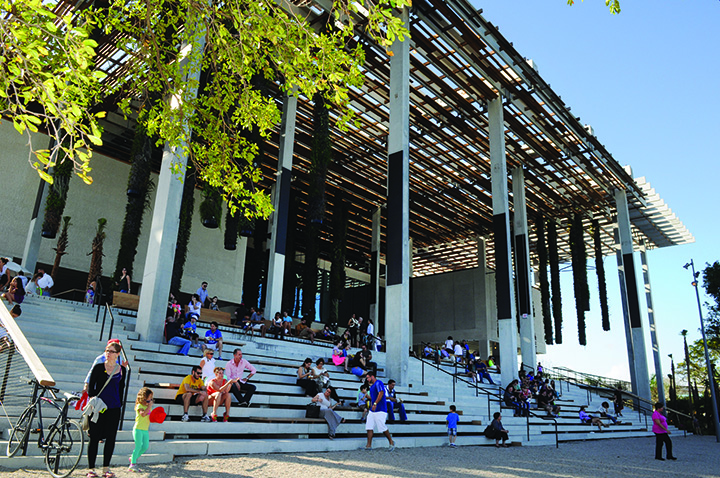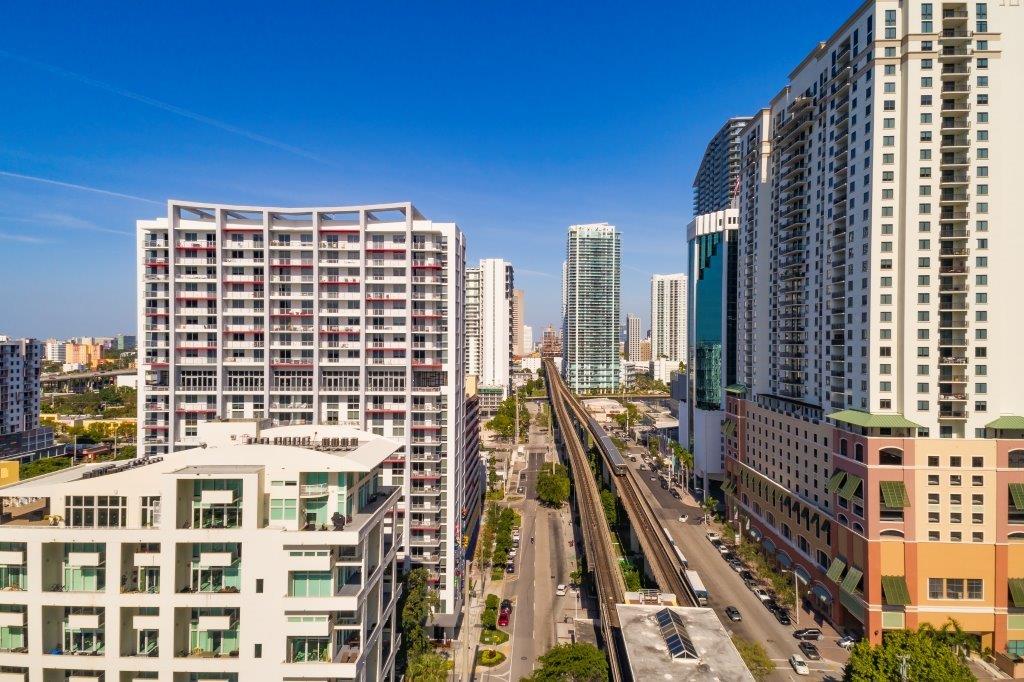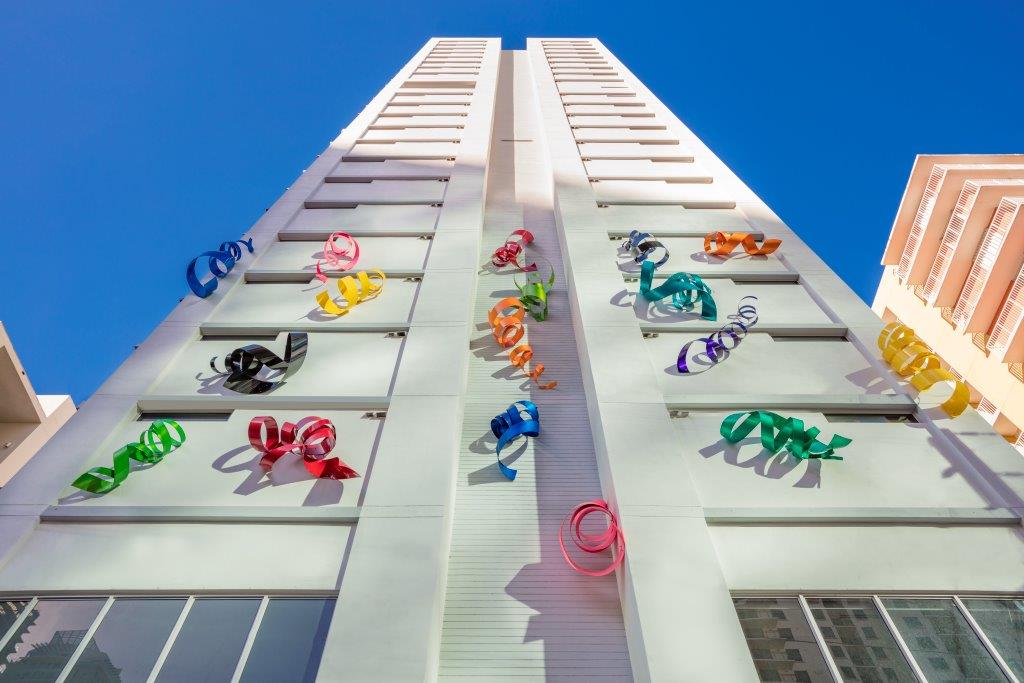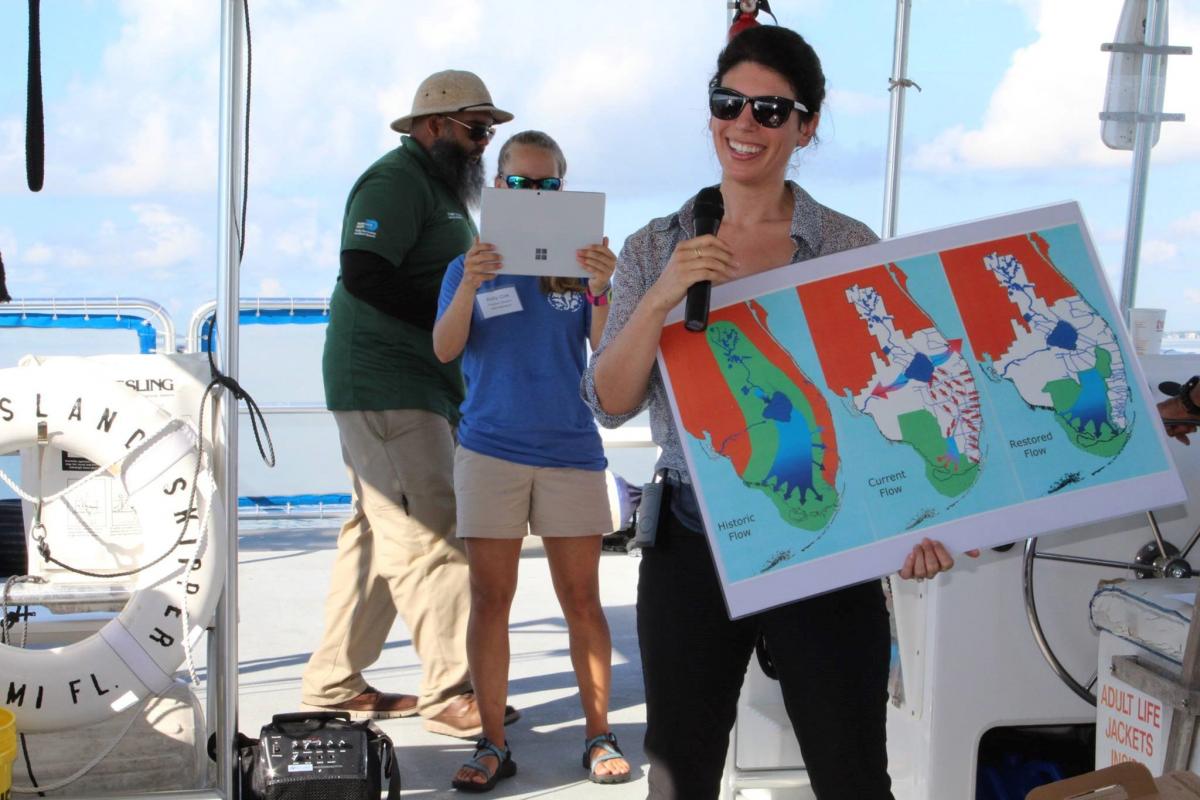Leading Together 2019 Conference - Preconference Programming
Preconference Programming
We affered three (3) preconference and three (3) site sessions for attendees interested in diving deep into hot topics impacting philanthropy now and seeing and supporting local philanthropy in action in the field. Sessions took place on Monday, April 29, 2019, from 12:00 pm – 5:00 pm, in advance of the official start of Leading Together 2019.
Preconference Sessions require advance registration and are included in the conference pricing. Individuals can register for a session independently from the full conference.
Site Sessions require advance registration and are included in the conference pricing. All host sites are ADA compliant.
A Community Foundations Excellence (CFE): Fundamentals course was also offered on Sunday, April 28 - Monday, April 29, 2019.
Preconference Sessions
U.S. Communities in Crisis
Monday, April 29 - 12 p.m. - 5 p.m.
Over the last several years, many U.S. communities have experienced crises that have had a physiological effect on neighborhoods and traumatized children, youth and families. The violence in Parkland, Las Vegas, Charlottesville, Pulse Night Club, Flint, Detroit and Sandy Hook, among others, propels us to attempt to solve the intractable problems our communities are facing today. But what exactly is the role of philanthropy in responding to communities in crisis? In situations like the violent situations listed above, philanthropy played a pivotal role in responding to tragedies and civil discourse. Around the country, foundations are convening communities and bridging divides on some of America’s most pressing issues: race, politics, religion and social economics. This pre-conference featured case studies and best practices on how to take a leadership role and partner with your local government and brokedown the different aspects of crisis response: immediate, preparedness to resiliency and long-term recovery.
- 12:00 – 12:45 pm — Opening: Traumatized Communities in America — lunch with a powerful keynote speaker who provided insights into the deep impact of traumatized families, neighborhoods and communities caused by hate, violence, and tensions in America.
Speaker: K. Sabeel Rahman, President, Demos - 1:00 – 2:20 pm — Building Resilience and Root Cause Solutions — Spark talks on solutions and tools being deployed by funders to build resilience and address root causes within communities.
Speakers: Mark Brewer, President and CEO, Central Florida Foundation; Eileen Bulger, Chair, American College of Surgeons Committee on Trauma, American College of Surgeons; Joshu Harris, Chair, Standing Committee on Gun Violence, American Bar Association; Amy Horton-Newell, Director, Center for Public Interest Law, American Bar Association; Ellen Quigley, Vice President of Programs, Richard M. Fairbanks Foundation; Sabrina Wu, Senior Fellow, Inclusive Economy, East Bay Community Foundation - 2:30 – 4:00 pm — Philanthropy’s Response to Divisiveness — Three 30-minute action learning conversations with philanthropy leaders who have or are responding to crises in their communities related to hate and civility, gun violence, and public health.
Speakers: Brennan Gould, President and CEO, Charolettesville Area Community Foundation; Mark Brewer, President and CEO, Central Florida Foundation; Kabir Kumar, Senior Director, Community, Walmart Foundation; Isaiah M. Oliver, President and CEO, Community Foundation Greater Flint; Tim Daly, Senior Program Officer, Gun Violence Prevention & Justice Reform Program, The Joyce Foundation, Karen McNeil-Miller, CEO, Colorado Health Foundation - 4:15 – 5:00 pm — Closing: The Unenviable Task of Putting a Value on Human Lives — Close out with the all-too-real conversation that philanthropy finds itself in times of crisis—providing the philanthropic dollars to respond and distributing funds to assist individual victims and their families that comes with life’s misfortunes.
Speaker: Deborah Greenspan, Partner and Co-Chair of Energy, Environment & Mass Torts Practice Group, Blank Rome LLP
Global Grantmaking Models: Options and Innovation for US Grantmaking
Monday, April 29 - 12 p.m. - 5 p.m.
Does U.S. philanthropy fare better at helping sustain local civil society organizations around the world than official development aid? Foundations have a plethora of options for how to fund programs overseas – from making grants to US-based international NGOs implementing programs overseas or working with intermediary US-based partners to directly funding grassroots groups around the world. As global grantmaking continues to increase, what innovations are helping US foundations improve their impact globally? This was a half-day pre-conference where we heard from organizations that are exploring new approaches to international giving. Funders leave this pre-conference with concrete examples for how to effectively work with grantees in the US and around the world, including in challenging situations with rapidly closing space for civil society and increased foreign funding restrictions. From veteran global grantmakers to those new to the process of global giving, this session has valuable insights for any US foundation working internationally.
- 12:00 – 12:45pm — Welcome, Introductions, and Data Trends in Global Giving by US Foundations — Over lunch, speakers outline the latest data trends for how US foundations are supporting global programs, including how much is flowing directly to organizations implementing programs in the country where they are located.
Speaker: Lauren Bradford, Director, Global Partnerships, Candid. - 12:45 – 2:00pm — #ShiftThePower: Innovations in Global Giving — In a series of inspiring spark talks, leaders from around the globe share how they are piloting new ways to enhance funding flows directly to communities, from technological solutions to new financing models.
Speakers: Alix Guerrier, Chief Executive Officer, GlobalGiving; Jennifer Lentfer, Director of Communications, Thousand Currents; Nicholas S. Deychakiwsky, Program Officer, Civil Society, Mott Foundation - 2:30 – 3:30pm — Direct Grantmaking Strategies Amidst Increasing Restrictions — How are funders working amidst the challenges of “closing space” that can make it harder for philanthropic grants to flow across borders? Hear from a variety of funders working in difficult contexts for how they effectively navigate the changing regulations impacting cross-border giving.
Speakers: Jessie Krafft, Vice President of Donor Advised and Grant Services, CAF America; Martha Lacrkritz-Peltier, Senior Counsel, NGOsource; Thomas Hilbink, Director, Grant Making Support Group, Open Society Foundation - 3:30 – 4:30pm — New Ideas for Non-Financial Support of Global Programs — Are you effectively leveraging non-financial ways to support global programs? Funders share concrete examples of non-financial resources, from convening to technical assistance, they are employing to strengthen relationships with partners around the world.
Speakers: Nina Blackwell, Executive Director, Firelight Foundation; Sonia Balcazar, Consultant, Synergos Consulting Serivces; Ferne Mele, Director, Program Planning & Monitoring, The Synergos Institute; Teresa Crawford, Executive Director, Social Sector Accelerator, Counterpart. - 4:30 – 5:00pm — Closing Keynote – Future of Grantmaking by US Philanthropy
Speakers: Felix Oldenburg, Secretary General, Association of German Foundations; Ana Marie Argilagos, President & CEO, Hispanics in Philanthropy
Building a 2020 Policy Agenda Together
Monday, April 29 - 12 p.m. - 5 p.m.
Having a strong policy presence in Washington is a priority for the Council. We want to hear from you!
This Pre-Conference Session offered a dynamic afternoon starting with lunch with the Board of the Council and our new Council President Kathleen Enright. During the afternoon we learned from highly successful advocates and shared advocacy experiences with peers. Recognizing the diversity of Council membership and different policy priorities, we had time for break out discussions with just private foundations and community foundations. Representatives from federal agencies joined us to explore mission related policy opportunities and the Council’s valued role as a gateway to leveraging philanthropy’s individual and collective missions. In considering the many issues facing philanthropy, we look forward to your help in prioritizing the issues that should frame the Council’s Policy Agenda for the Federal Government.
- 12:00 – 12:30pm — Networking lunch, followed by Welcome & Introductions
Speaker: Kathleen Enright, President & CEO, Council on Foundations - 12:30 – 1:00pm — Keynote Address: Wide Open Opportunities for Philanthropy — Former Mayor of Melrose and former Massachusetts State Representative and now founding partner of the Civitas Public Affairs Group, Patrick Guerriero raises five provocative questions in the Stanford Social Interview Review article, When Philanthropy Meets Advocacy, he co-authored last summer with Susan Wolf Ditkoff of The Bridgespan Group. He makes a convincing case that there are “wide-open opportunities for philanthropists to help grantees step into the public arena, educate lawmakers, and influence legislation that mobilizes their social missions.
Speaker: Patrick Guerriero, Founding Partner, Civitas Public Affairs Group - 1:00 – 1:50pm — What's on Your Mind? — Building on the five questions shared by Patrick and key trends from Lucy’s 2019 Blueprint for Philanthropy and the Digital Civil Society, this interactive real-time polling experience prioritizes the issues facing philanthropy. What is urgent for 2019? What should be the focus for 2020? What is missing?
Speakers: Rob Collier, Senior Policy Advisor, Council on Foundations; Lucy Bernholz, Senior Research Scholar, Director, Digital Civil Society Lab, Stanford PACS - 1:50 – 2:00pm — Break
- 2:00 – 3:00pm — A Smart Policy Agenda Requires Smart Data — The federal government is a significant stakeholder in foundation place-based strategies. How can you best leverage this support? Learn about the Council’s unique Federal Philanthropy Liaisons program and how it proactively builds relationships with federal agencies for the benefit of COF members, including the Departments of Veterans Affairs, Housing and Urban Development, Health and Human Services, Commerce, and Agriculture and FEMA, to name a few. Two Federal Liaisons share how they view the value of philanthropic partnerships for innovation and the ability of philanthropy to align charitable missions with the public agenda.
Moderator: David McGhee, Associate Vice President, Organizational Excellence and Impact, The Skillman Foundation
Speakers: Noah Berger, Director, Policy Reform and Advocacy, Annie, E. Casey Foundation; Eileen Ellsworth, President and CEO, Community Foundation for Northern Virginia - 3:00 – 3:45pm — Federal Agencies – Policy Opportunities in DC and Your Region Too — The federal government is a significant stakeholder in foundation place-based strategies. How can you best leverage this support? Learn about the Council’s unique Federal Philanthropy Liaisons program and how it proactively builds relationships with federal agencies for the benefit of COF members, including the Departments of Veterans Affairs, Housing and Urban Development, Health and Human Services, Commerce, and Agriculture and FEMA.
Moderator: Stephanie Powers, Vice President, Policy and Partnerships, Council on Foundations
Speakers: Cynthia Campbell, Director, International and Philanthropic Affairs, U.S. Department of Housing and Urban Development; Mishaela Durán, Director, HHS/Administration for Children and Families, and Melissa Lim Brodowski, PhD, MSW, MPH, Strategic Initiatives Lead, Administration on Children and Families, U.S. Department of Health and Human Services - 3:45 – 4:00pm — Break
- 4:00 – 4:30 — Policy Priorities for Philanthropy and the Role of the Council — Attendees identified current and anticipated “hot” federal policy issues that philanthropy needs to keep its eye on in the next year and what policy priorities the Council should examine for action that would advance the interests of the sector.
Moderators: Stephanie Powers, Vice President, Public, Policy and Partnerships, Council on Foundations; Ana Montanez, Government Relations, Associate, Council on Foundations - 4:30 – 4:40 — Breakout Discussion Groups Report
- 4:40 – 5:00 — Next Steps
Comments: Rob Collier, Senior Policy Advisor, Council on Foundations; Sandra Swirski, Partner, Urban Swirski & Associates, LLC
Site Sessions
Bridging Divides — Community, Philanthropy, and the Arts
Monday, April 29 - 11 a.m. - 4 p.m.

Cities around the world are emerging as creative forces thanks to their burgeoning arts and creative districts — attracting talent and investment, spurring business, and boosting quality of life. Communities are also leveraging arts and culture to unite and encourage discussion of sensitive issues.
Miami has been viewed as a model for how arts and culture can flourish citywide and spur economic growth and community building. How Miami got its art scene can be traced to the philanthropist Jorge M. Pérez. In addition to supporting several arts and culture organizations including the National Foundation for the Advancement of the Arts, Miami International Film Festival, Adrienne Arsht Center, Gables Stage, Miami Music Project, Arts for Learning Miami, Miami New Drama, Nu Deco Ensemble, South Florida Art Center and The Fountainhead Experience, Pérez provided a generous leadership gift to construct a new home for Miami Art Museum, ultimately helping to transform a derelict 30-acre waterfront site into Museum Park and affirm the region’s growing stature as a global capital. In 2013, the museum was renamed Pérez Art Museum Miami (PAMM).
PAMM helped Miami further retain its creative reputation by luring the heralded art critic, editor, writer, and curator Franklin Sirmans to be its director. Since 2015, Mr. Sirmans has ensured that PAMM’s art program reflects the community in Miami and has secured some of the largest donations of works in the museum’s history.
Our visit to PAMM featured an intimate conversation between the two creative leaders who are making Miami central to the arts world. We learned and discussed how philanthropy can play a role in the intersection of art, economics, and community. Guests were also treated to a guided tour of the galleries.
Speakers: Franklin Sirmans, Director, The Pérez Art Museum Miami (PAMM); Jorge M. Pérez, Chairman & CEO, The Related Group
Inclusive Economic Prosperity — Affordability: Liberty City and Brickell
Monday, April 29 - 12 p.m. - 5 p.m.


In February 2015, Miami-Dade County Mayor Carlos A. Gimenez committed $74 million for an initiative to revitalize Liberty City and Liberty Square. This area is the oldest public housing project in the southeast US and was built in 1937 under President Franklin Delano Roosevelt. The ambitious redevelopment project involves demolishing and rebuilding Liberty Square’s 709 public housing units in phases, and will be undertaken by Related Urban Development Group, the affordable housing arm of Miami’s biggest luxury condo developer. The end product will be a bustling, mixed-income community with shops, parks, community facilities and 1,400 residences, townhouses and apartments. The initiative seeks to address the issues of crime and poverty in the area by raising the standard of living for residents and creating new opportunities, through economic development. The project is a partnership between Related Group and Miami-Dade County.
Established in 1997, Pinnacle Housing Group is a full-service real estate development company committed to solving the critical need for high-quality housing attainable for working families and seniors in the Southeastern United States' urban centers, suburban areas and rural communities. Brickell View Terrace is a mixed use/mixed income multi-family development in the prestigious Brickell Avenue area in downtown Miami. The development is located adjacent to the Brickell Metro Rail Station, just west of Mary Brickell Village on SW 1st Avenue between SW 9th street and SW 10th Street. The development consists of 100 affordable housing units, another 76 market rate units, and approximately 7,300 SF of retail within the residential tower. The retail is on the first floor of the residential tower, with the structure rising to a total height of twenty-three stories. It is located in what has become one of most dense urban areas in the country.
This site visit toured the Liberty City and Brickell housing initiatives, providing an opportunity to see philanthropic dollars in action developing homes for underserved communities. After the tour, we joined in a conversation with Alberto Milo and Kareem Brantley from Related Group and Mitch Friedman from Pinnacle Housing Group to talk about the projects, challenges they faced, and their impact on the communities.
Speakers: Alberto Milo, President, Builders Association of South Florida; Kareem Brantley, Managing Partner, Bravis Fund Group; Mitchell Friedman, Partner, Pinnacle Housing Group; Louis Wolfson III, Partner, Pinnacle Housing Group; Michael Liu, Director, Miami-Dade Public Housing and Community Development
Climate Impact & Vulnerabilities — Everglades + Rural South Dade
Monday, April 29 - 10:15 a.m. - 4:30 p.m.
.jpg)

Miami is often referred to as “ground zero” when it comes to sea-level rise. The 2017 Preliminary Resiliency Assessment from Resilient305, a member of the Rockefeller Foundation’s 100 Resilient Cities network, presented a stark picture of the “Shocks and Stresses” facing Miami’s natural systems which are strained by climate change and urbanization. Everglades restoration is considered south Florida’s best strategy to protect drinking water supplies, provide natural buffers from flooding, and reduce carbon. Visitors to South Beach rarely appreciate that national parks, marine protected areas, marine sanctuaries and water management areas make up 2/3 of Miami-Dade county lands.
South Florida is home to the largest ecosystem restoration project ever undertaken and a world famous coral Florida coral reef tract that is as unique as the giant sequoias in California or network geysers of Wyoming. Our visit to the Everglades National Park provided an in depth look at the significant challenges facing Greater Miami in protecting its natural systems, and options we have to address them. We met nonprofit leaders from Miami Waterkeeper and South Florida National Parks Trust — two local nonprofits who are working to protect remarkable natural places in South Florida from climate risk, which have vast benefits for our low-lying urban environment and our economy.
Community Foundation Excellence Course
Community Foundation Excellence (CFE) Fundamentals
Sunday, April 28 - Monday, April 29 — Registration Costs - Members $595 Nonmembers $809
A well-trained staff and an informed board are critical to the success of community foundations in our fast-changing world. This two-day course helps new and experienced community foundation staff build the essential skills they need to balance governance and management. Created and led by experienced leaders, this course includes basic information on resource development and donor relations, governance, updates on key legal and legislative issues, and a review of community leadership and fiduciary responsibilities.
